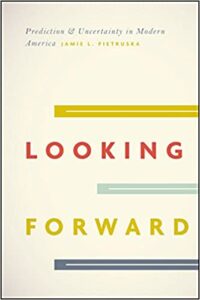The uncertainties of life often lead to a greater interest in predicting the future. Jamie L. Pietruska’s book Looking Forward (2017) documents and analyzes futurism in the late 19th to early 20th centuries and looks at how forecasting crept into daily life. Pietruska considers the development of weather, market and economic forecasts (all of which had skeptics and detractors) and there’s also a well-researched section on fortune telling. 
“Fortune tellers” include astrologers, card readers, palmists, mediums and psychics, who’ve been criticized and prosecuted in the U.S. since before the Civil War. Always popular (and perhaps because of it), they were denounced by scientists, the religious and mainstream society, and sometimes linked with crimes like counterfeiting, prostitution and even abortion (the presumption was that practitioners were usually scamsters and con artists). In the late 1800s, district attorneys and police began campaigns to prosecute fortune tellers in their cities; their stories were covered in dramatic fashion in daily newspapers (where the practitioners often advertised).
As early as 1895, well before astrologer Evangeline Adams’ first arrest in New York City in 1914, a fortune teller used the legal argument that she only read palms and did not “pretend to tell fortunes” (the legal jargon of the time). And in 1897, a Brooklyn jury agreed with the defense that palmistry was a recognized science, and acquitted the reader in two minutes. By the early part of the 20th century, these cases were often decided on character and intent, as the judge did with Miss Adams in 1914.
Pietruska seems as much an anthropologist as a historian; she documents the acceptance of antiquated laws and how society changed. This is a carefully researched work, and my book, Foreseeing the Future: Evangeline Adams and Astrology in America was quoted several times. It’s rewarding to see the same type of scholarly citations used for the other subjects. Astrology has a compelling history, and it’s refreshing to see it simply addressed as history, without the common “we know better” critiques.
There’s also a fascinating section on Adena Minott, a Jamaican-American businesswoman and activist who opened a “character reading” school in New York City that included phrenology, physiognomy, psychology and palmistry. The author shows that Minott’s story “reveals how antidivination law was used to enforce segregation in early twentieth-century cities as well as how the professional authority of a black educational institution challenged racial discrimination.” (Minott prevailed.)
The epilogue includes a look at the 2016 Trump election, when many mainstream and metaphysical forecasters miscalculated. People continue to crave predictability, despite the fact that all forecasts retain some degree of uncertainty. Like many astrologers, I favor knowing as much as we can.
Buy Looking Forward on Amazon.com
About my Amazon links.
